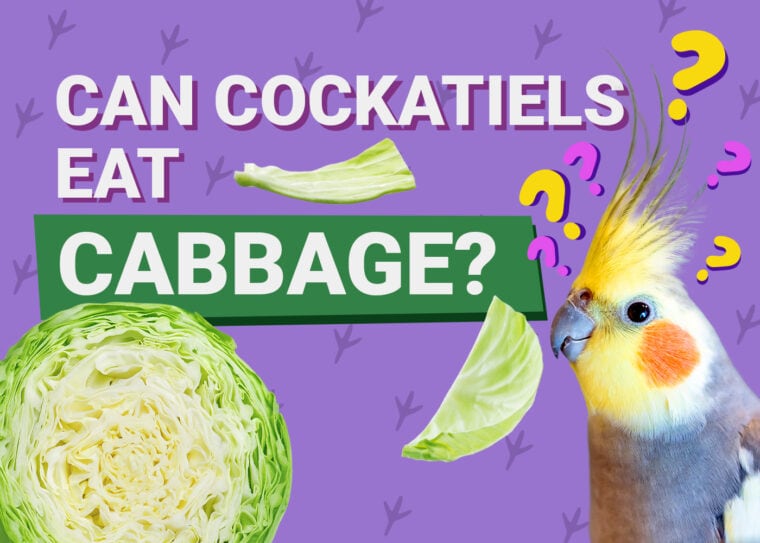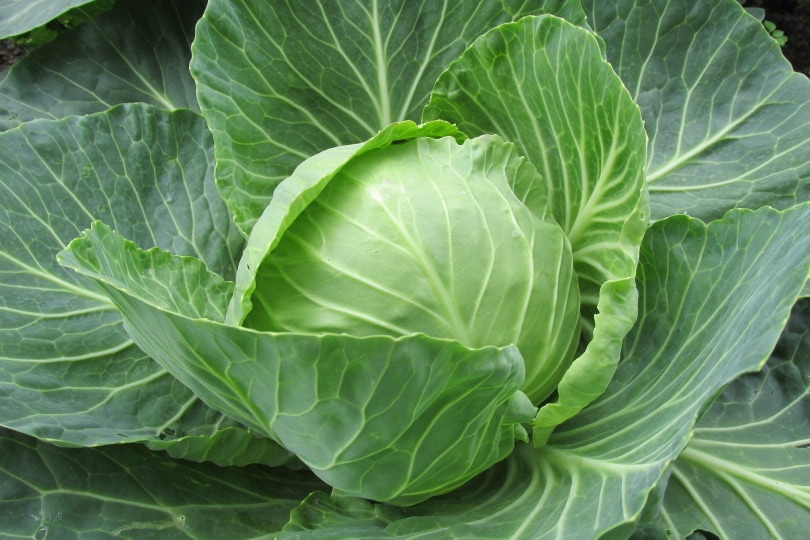
Friendly and social cockatiels enjoy a variety of foods in their diet. Many of them are safe for your bird, while others are strictly forbidden. Birds have small and sensitive digestive systems, so it doesn’t take much of a toxic food to quickly cause problems. With any animal, but birds especially, it’s important to know what’s safe for them to consume and what’s not in order to avoid innocently handing your pet something that they should not eat.
Cockatiels, like many other birds, enjoy fresh fruit and vegetables regularly. These are beneficial supplements to keep your bird from getting bored, while providing balanced nutrition. When you’re checking out the produce drawer in the fridge to see what you can offer your avian friend today, you might see cabbage and think that it’s a perfect choice. It’s crunchy and will be a low-calorie treat. Unfortunately, there is conflicting information about the safety of cabbage for cockatiels. When there is even a slight chance that something might not be good for your animal, it’s best to err on the side of caution and avoid it. With so many other things that your cockatiel can safely eat, they won’t miss cabbage.
 Is Cabbage Toxic to Cockatiels?
Is Cabbage Toxic to Cockatiels?
Can a cockatiel eat cabbage? Yes. Should they eat cabbage? Probably not. Toxic foods are foods that are poisonous to your animal, causing instant illness or worse. When it comes to cabbage, it isn’t on the toxic food list. Your bird likely won’t be poisoned by it. If you’ve fed some to your little friend already, don’t worry.
The main issue with cabbage is that it has compounds in it (that occur naturally) which interfere with thyroid hormone production. This may result in thyroid enlargement, or hyperplasia, also known as goiter. However, it is worth noting that cabbage or other goitrogenic foods (such as kale, broccoli, soybean, flax, rapeseed, and turnips) are not the sole reason why this disease may occur. However, their inclusion in a cockatiel’s diet (alongside other factors) may contribute to goiter.
That being said, the odds of cabbage solely causing goiter on its own when offered in moderation is extremely slim, and for most pet parents, seeing your cockatiel nibbling on cabbage on occasion isn’t a cause for immediate alarm.

But My Cockatiel Loves Cabbage
If that’s the case, your bird could probably enjoy a small amount safely once in a while, but it shouldn’t be a regular staple in their diet. Your avian vet could suggest a diet plan that will ensure that your bird’s nutrition is complete, so the extra cabbage treats won’t be harmful.
Providing a bird with proper nutrition can be difficult to do when they like to pick and choose what they consume. Digging through their food cups to select only the tastiest parts is something that birds enjoy. Poor nutrition is a leading cause of health problems in birds. If your bird is healthy and their nutritional needs are met, cabbage can be something that they enjoy in strict moderation. Cabbage provides little nutritional value and would be eaten simply because it’s something that the cockatiel likes to physically eat, not something that’s going to contribute to their long-term health.
Feeding your cockatiels the wrong mixture of seeds can be dangerous to their health, so we recommend checking with an expert resource like The Ultimate Guide to Cockatiels, available on Amazon.
This excellent book will help you balance your cockatiels’ food sources by understanding the value of different seed types, dietary supplements, fruits and vegetables, and cuttlebone. You’ll also find tips on everything from housing to health care!
What Can I Give My Bird Besides Cabbage?
Since a proper diet is so hard to ensure for a bird, feeding them pellets is an easy way for them to get all their nutrition. Pellets, combined with fresh vegetables, nuts, and other protein sources, and fruits, will give your bird a variety of foods to keep them happy. Pellets can be boring, though, so make sure your cockatiel is actually eating them and not just sticking to the supplemental foods.
Always be sure to thoroughly wash any fruits or vegetables to remove pesticides before offering them to your cockatiel. Offer the food in small pieces, and remove and throw away any uneaten food. Be sure fresh water is available at all times.

What to Never Feed a Cockatiel
While cabbage might be okay once in a while, there are certain foods that you should never give to your bird:
Check with your vet before offering your bird anything new to make sure it’s okay to add to their diet.
Final Thoughts
While the conflicting reports about cabbage remain, it’s important to remember the potential risks of the food and decide if it’s worth giving to your bird. If your cockatiel has never had cabbage, they aren’t missing it. If they love cabbage, they may be able to enjoy it in moderation. But whether you have a cabbage-lover or a cabbage-newbie, make sure your bird’s diet is nutritionally complete. There are many healthy food choices out there for your cockatiel, so you can create a diet that’s exciting and tasty and keeps them in great shape.


 Is Cabbage Toxic to Cockatiels?
Is Cabbage Toxic to Cockatiels?






